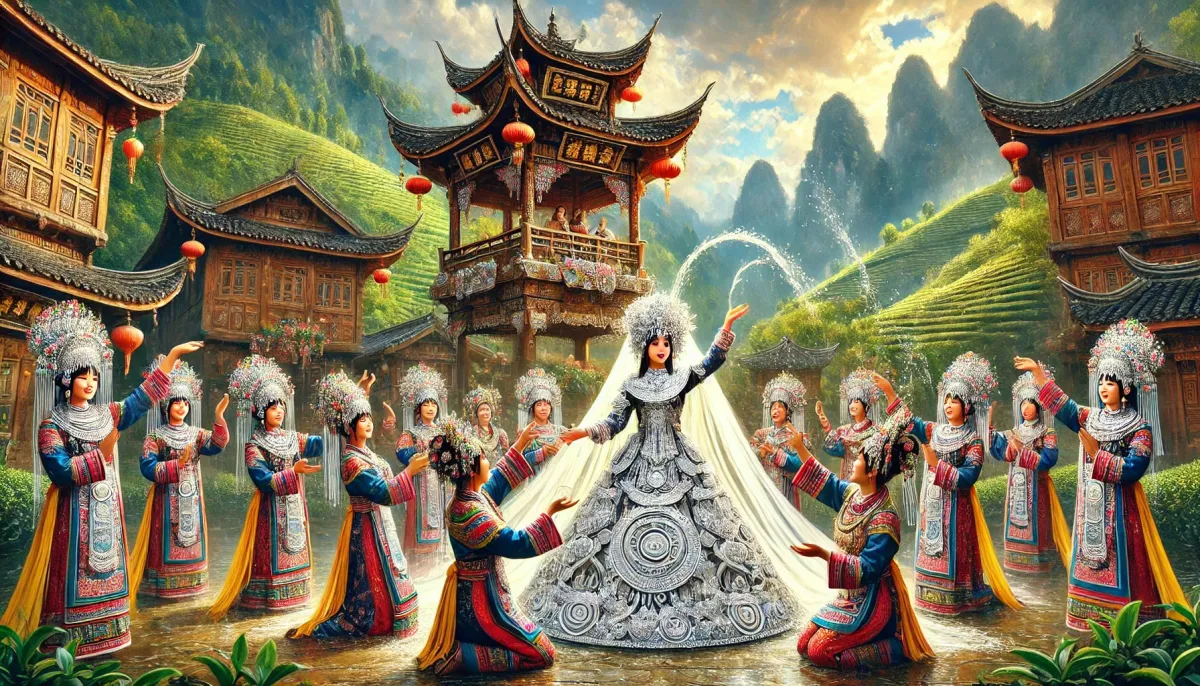Hi everyone, Mark here! As a seasoned backpacker with a passion for exploring Asia's vibrant cultures, I recently embarked on an unforgettable journey to the heart of Sichuan province in China. My adventure led me to a remote Yi village nestled within the breathtaking landscapes of the Ma'bian Yi Autonomous County, where I had the incredible privilege of witnessing a truly unique Yi wedding ceremony. This wasn't just any wedding; it was a window into the soul of a culture, challenging preconceived notions and offering an intimate look at the traditions and customs of the Yi people.
My Journey to the Yi Village
My journey began with a thrilling motorcycle ride through the picturesque countryside. The scenery was stunning – rolling hills, winding rivers, and a landscape that felt both ancient and timeless. I was headed to the Yi village, part of the Ma'bian Yi Autonomous County, located in the southwestern region of Leshan City, Sichuan. The county, situated between the Minshan Mountains and the Dadu River valley, is known for its mountainous terrain and high altitudes, covering an area of over 2,400 square kilometers. It borders Leshan City to the east, Ya'an City to the west, and Ganzi Tibetan Autonomous Prefecture to the south. The air was crisp and carried the scent of pine, while the towering mountain ridges resembled strokes in a stunning watercolor painting.
The Significance of Silver in Yi Culture
The Yi women's traditional attire was a feast for the eyes; I've never seen so much silver adornment on clothing before! In several of my previous videos, I delve deeper into the historical and cultural significance of silver in Yi culture. It's believed that salt, possessing a mystical and protective power, holds a central place in their culture, and silver is seen as an extension of this belief. Therefore, silver jewelry is not merely ornamentation but acts as a sacred object, warding off evil and bestowing blessings. In Yi mythology, silver is often associated with deities, ancestors, and the forces of nature, often portrayed in stories as a divinely bestowed treasure, a symbol of wealth, power, and protection. During my visit to the Bu Tuo County Torch Festival in 2024, several Yi women shared that a complete silver outfit is a family heirloom, a prized possession carefully guarded and often worth tens of thousands of yuan.
The Wedding Attire: A Story in Fabric
The bride’s wedding attire held special significance. She wore three distinct garments: the innermost garment, worn since childhood; the middle garment, donned during her coming-of-age ceremony; and the outermost, specifically for her wedding day. Each piece is intricately crafted, exuding opulence and a sense of timeless elegance.
Why a Wedding? The Perfect Lens on Culture
My fascination with minority wedding ceremonies began in 2021 during an unexpected encounter with a Tajik wedding in Xinjiang, a memory that continues to resonate with me. I've found that attending a wedding is the ideal way to fully and swiftly grasp a minority culture's customs and traditions, as the day itself serves as a concentrated display of their cultural richness, practices, and values. I even toyed with the idea of documenting the wedding ceremonies of all 56 ethnic minorities in China. Having previously filmed Yi Torch Festivals and New Year celebrations, I decided to start with an Yi wedding, ultimately connecting with the bride online. After traveling over 1,500 kilometers from Guangxi, I arrived at this very special event.
A Glimpse into the Wedding Festivities
The bride's family resided in a village perched on a hillside, surrounded by tea plantations. Ma'bian County, I learned during a tea-drinking session in 2023 with a welcoming local, has a rich history of tea cultivation, with locally produced green and black teas gaining regional recognition. I was the only Han Chinese person present at the wedding, which involved primarily Yi language conversations (that I couldn't understand!), a language belonging to the Tibeto-Burman branch, long established in southwest China, mainly stemming from the ancient Qiang people of western China.
Yi Marriage Customs: A Living History
Yi wedding customs are a living testament to their rich history. Their marriage traditions aren't just personal affairs; they deeply involve the entire family, relatives, and neighbors. Ancient Yi texts like the Le'eote Yi, Gong Shi Chuan, and Mu Shi Chuan detail their journey from a matriarchal society ("knowing only mothers, not fathers") to a patriarchal one, marked by the legendary figure Shi'er'eote's quest to find his father, culminating in marriage and the establishment of "seeing fathers through sons." Their marriage system has evolved through various stages, from group marriage and monogamy to the current predominantly monogamous structure.
Modern Meets Traditional: A Unique Blend
The wedding I witnessed was particularly unique due to the families’ comparatively high economic status, especially the groom's family, leading to some deviations from traditional Yi wedding ceremonies. The bride and groom, after a successful matchmaking arrangement, met, exchanged pleasantries, agreed on a dowry, and essentially sealed the deal. Further meetings involved pre-wedding photoshoots. I discovered that some Yi couples even meet for the first time at their wedding. I'd met the bride earlier in 2023 at an Yi New Year's celebration, but was unfortunately unable to attend her 2024 wedding due to prior commitments.
The Wedding Day: A Celebration of Culture and Community
The wedding festivities unfolded with vibrant energy. The bridesmaids' water-throwing ceremony, a pivotal part of Yi tradition, symbolized good luck and the washing away of negativity, welcoming a fresh start. The groom's entourage, arriving slightly late due to challenging road conditions, added to the day's excitement. The event brought together family, friends, and villagers, creating a lively atmosphere brimming with laughter, music, toasts, and heartfelt well-wishes.
A Deeper Look into Yi Traditions and Modernity
The Yi wedding isn't just a celebration of a couple's union; it’s a vibrant display of their culture. Interestingly, the younger generation, often well-educated, navigates the intersection of modern views and centuries-old traditions, making informed choices about which customs to uphold and which to adapt.
The Wedding's Conclusion and My Reflection
The wedding concluded with heartfelt goodbyes and promises of future reunions. The two days were filled with incredible cultural immersion and unique experiences. I learned that despite our varying lifestyles, cultural norms, faiths, and beliefs, embracing open-mindedness and understanding towards the uniqueness of our world is essential.
Table: Key Facts about Ma'bian Yi Autonomous County & Yi Culture
| Feature | Description |
|---|---|
| Location | Southwestern Sichuan Province, China |
| Area | Over 2,400 sq km |
| Terrain | Mountainous, high altitude |
| Ethnic Group | Predominantly Yi people |
| Major River | Ma'bian River (a tributary of the Min River) |
| Economic Activity | Tea cultivation, tourism |
| Traditional Yi Clothing | Heavily adorned with silver jewelry |
| Silver's Cultural Significance | Symbol of protection, wealth, and connection to ancestors and deities |
| Marriage Customs | Traditional practices like matchmaking, water-throwing ceremonies, wrestling matches |







